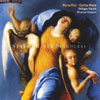Pergolesi Salve Regina; Stabat Mater
Lush textures and profound expression in Pergolesi’s famous last work
View record and artist detailsRecord and Artist Details
Composer or Director: Francesco Durante, Giovanni Pergolesi, Carlos Mena
Genre:
Vocal
Label: Mirare
Magazine Review Date: 3/2006
Media Format: CD or Download
Media Runtime: 54
Mastering:
Stereo
DDD
Catalogue Number: MIR006

Tracks:
| Composition | Artist Credit |
|---|---|
| Stabat mater |
Giovanni Pergolesi, Composer
Carlos Mena, Composer Giovanni Pergolesi, Composer Nuria Rial, Soprano Philippe Pierlot, Zedlau Ricercar Consort |
| Salve regina |
Giovanni Pergolesi, Composer
Giovanni Pergolesi, Composer Nuria Rial, Soprano Philippe Pierlot, Zedlau Ricercar Consort |
| (8) Concerti per quartetto, Movement: F minor |
Francesco Durante, Composer
Francesco Durante, Composer Philippe Pierlot, Zedlau Ricercar Consort |
Author: David Vickers
Pergolesi composed his Stabat mater in 1735 during his final illness. It was created to supplant Alessandro Scarlatti’s setting, performed every year on the Friday before Palm Sunday at the Franciscan church of San Luigi in Naples. There are recordings available which cater for every taste – brisk theatricality (Rousset on Decca, 12/99), chamber-scale intimacy (King on Hyperion, 11/88) or minimal but passionate (Alessandrini on Naïve, 12/04). This new version does not have all the answers but it does make a commendable contribution to the discography. An orchestral interlude by Durante (Pergolesi’s teacher) has sonorous depth and sincerity. It serves as a vital aperitif before Pergolesi’s Salve regina, in which Carlos Mena’s quivering timbre is vulnerable. The resonant instrumentalists occasionally drown him out. I am more convinced by Mena’s darker tones in the Stabat mater, although he seems breathless and hasty in ‘Quae moerebat’: the chirpy and quick mood is not an ideal interpretation of ‘silent, ceaseless mourning’. Nuria Rial’s clean-toned singing in ‘Vidit suum’ has impressive control, clarity and profound expression. The two voices blend effectively in ‘Quis est homo’. ‘Inflammatus et accensus’ seems a touch nonchalant, although the extreme contrast with a very slow ‘Quando corpus’ magnifies the range of affects. Some aspects are superbly judged: several ritornelli are perfectly weighted and the Ricercar Consort play with sensual warmth – a sensation encouraged by a larger body of strings than is used in some performances.
Discover the world's largest classical music catalogue with Presto Music.

Gramophone Digital Club
- Digital Edition
- Digital Archive
- Reviews Database
- Full website access
From £8.75 / month
Subscribe
Gramophone Full Club
- Print Edition
- Digital Edition
- Digital Archive
- Reviews Database
- Full website access
From £11.00 / month
Subscribe
If you are a library, university or other organisation that would be interested in an institutional subscription to Gramophone please click here for further information.




